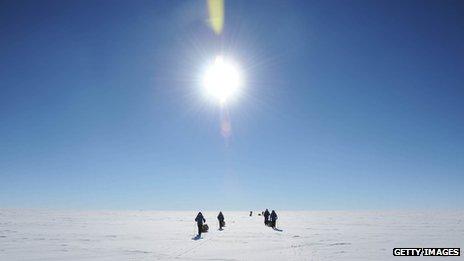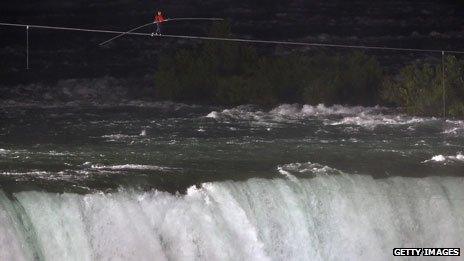What adventures are actually left?
- Published

The British explorer Sir Ranulph Fiennes's latest adventure is to lead the first winter crossing of Antarctica. But are there many meaningful challenges left for intrepid explorers?
Sir Ranulph Fiennes has already earned plaudits for crossing Antarctica unaided, discovering the Lost City of Ubar and taking a hovercraft up the Nile.
But genuine firsts in exploration are getting hard to find. The world's greatest peaks have all been climbed.
The earth has been circumnavigated many times by plane, foot, bicycle and balloon, among other means of conveyance. Many of the major rivers, lakes and seas have been swum or canoed.
There are few genuine unknowns. Satellite navigation technology allows mankind to see almost every river, copse and hill.
Machines can do the lifting and keep adventurers connected. Fiennes will be followed by two bulldozers dragging industrial sledges carrying supplies and living quarters.
But once upon a time warriors like Alexander the Great and Genghis Khan led their forces thousands of miles overland across unknown topography, while fighting off rival armies. Great navigators - Vasco da Gama, Christopher Columbus, Captain Cook - "discovered" new continents.
In the late 19th Century a ragbag of missionaries, gentlemen explorers and speculators began the scramble for Africa with little knowledge of what awaited them.
Exploration today is a dying art. The new feats are often about endurance as much as discovery. Firsts are ever more specialist and technically defined - first successful dive at the north pole (Joseph MacInnis), first person to jetpack across the English Channel (Yves Rossy), oldest woman to climb Everest (Tamae Watanabe).
So is there anything left to do? Something combining that potent mix of danger, novelty and a clearly defined natural barrier to overcome.
Gangkhar Puensum, in Bhutan, is said to be the highest unclimbed mountain standing at 7,570m. In fact, it's illegal to climb it.
Dave Pickford, editor of Climb magazine, explains that "political challenges are often bigger challenges than the physical ones".
Mountaineering in Bhutan is extremely restricted, apparently due to a combination of environmental concerns and respect for local spiritual beliefs. Some Bhutanese consider the mountain peaks to be the sacred homes of protective spirits or deities.
Numerous virgin peaks remain in areas previously inaccessible, he adds. Western Tibet, in China, is becoming popular with climbers thanks to the Chinese government relaxing access restrictions over the last 15 or so years.
With the summits of the world's 14 mountains over 8,000m long since reached, climbers have now taken to skiing down them.
Most of the 14 major mountains, including Everest (Davo Karnicar) in 2000, have been completed, extreme skiing site wildsnow.com suggests. But K2, Makalu and Kangchenjunga, in the Himalayas, remain un-skied or un-skiable from the summit.
Most of the big polar journeys have been done. Roald Amundsen beat Scott to the south pole in 1911. And in 1926 Amundsen was the first to indisputably reach the north pole (by airship), although many people believed Robert Peary did it some years before.
Many of the great rivers and oceans have been swum. Benoit Lecomte is credited with being the first to swim the Atlantic, although there is no official corroboration. Lewis Pugh has swum a kilometre at the north pole, Lynne Cox a mile in Antarctica, and Martin Strel the length of the Amazon.
The Pacific Ocean remains unswum with Lecomte planning an attempt, external.
The Nile and Congo rivers are also unconquered. The first man to swim the English Channel, Captain Matthew Webb, perished in the Whirlpool Rapids below Niagara Falls. No-one since has succeeded in swimming them.
Strel, the Slovenian who has also swum the Yangtze, Mississippi and Danube, says the Nile is on his to-do list. But there are big problems to overcome in the planning.
"It is a huge river and very beautiful. But some parts are very narrow. There are tropical diseases, fighting in Sudan, dangerous tribes and a lot of dangerous animals." To have any chance of success he would need military support and "huge" financial backing.
There is no shortage of other swimming challenges left. Strel plans to swim across the Grand Canyon, along 1,000 miles of the freezing Mackenzie River in Canada, and the length of the 2,000-mile Volga.
And Simon Murie, founder of niche tour operator Swimtrek, says the Strait of Hormuz (Oman-Iran), Gulf of Aqaba (Egypt-Saudi Arabia) and La Perouse Strait (Hokkaido, Japan - Sakhalin, Russia) are all waiting to be swum. "They're all achievable but as far as I know haven't been done, for political reasons rather than anything else."
Today the means is often what makes an adventure novel. Helen Skelton cycled to the south pole. And has anyone tried to bicycle up Mont Blanc?
Benedict Allen, the first explorer to cross the Amazon basin at its widest point, says the "great, glamorous journeys" have mostly been done. What is left is adventuring.
He is an admirer of Fiennes's achievements. But what he does is closer to extreme sport than exploring.
"As a physical and mental specimen he is extraordinary. They should bottle him when he dies and put him in a museum. But it isn't exploration."
The Antarctic has been crossed before. And Fiennes will have GPS, satellite phones and support from the outside world, he says.
Pen Hadow, the first man to trek solo from Canada to the north pole without resupply in 2003, agrees with the distinction.
Adventurers are there to find out about themselves. Exploration entails the discovery of novel or remote aspects of the natural world and communicating scientific learning.
Paul Rose, vice-president of the Royal Geographical Society, agrees that most of the "blockbusters" have gone. But a huge number of unclimbed peaks and never frequented areas in Greenland, Antarctica and elsewhere remain.
"It's one of the beauties of being alive - we can float down a bit of river or walk across a bit of desert where no-one has ever been," Rose says. "It's not Everest. But these days anyone can get to the top of Everest, given enough money."
Only last year a new cave system was discovered in Yorkshire. "We'll be discovering new physical challenges for the rest of humanity," he predicts.
The next big challenge is discovering the ocean depths. Look beneath the surface of the sea and mankind still knows very little. Most of the world's oceans are less mapped than the surface of Mars, Rose says.

Being first matters, Hadow believes.
"You have a nugget of gold in your back pocket. Though infinitesimally small, it says you are part of human progress, pushing the boundaries of humanity. Nobody else can ever be the first."
There's also the relief. "I was very happy I was still alive," recalls Strel of completing his 3,274-mile Amazon swim.
Many explorers now focus on aesthetics, cutting back on equipment or taking the toughest route. Allen forgoes modern communication equipment. "For me exposure and vulnerability is incredibly valuable. Your emotions and body have to confront the unknown."
Sometimes it ends in heroic failure. Allen tried and failed to cross the frozen Bering Strait pulled by huskies. He doubts now whether anyone will ever achieve it due to the melting sea ice. "It's not freezing over. The world has changed."
Perhaps some feats will forever remain beyond the wit and courage of man.
- Published9 October 2012